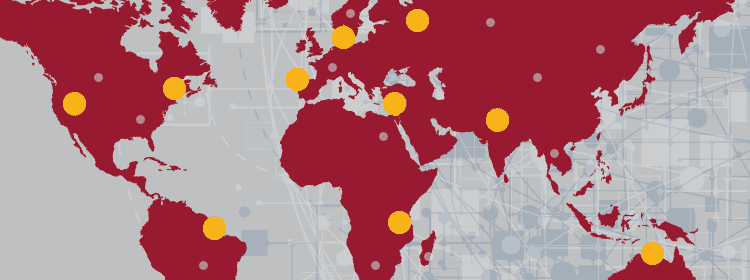
In his book The World Is Flat, New York Times columnist Thomas Friedman describes how the world has become “flat” – meaning that, thanks to the personal computer and the innovations it spawned, instantaneous communication around the globe is possible.
Nowhere has this change had more impact than on the international business community. Because of the technology now available, a worker in a cube in the United States can be working closely with someone in India, China or anywhere else in the world. Truly, the economy has become global.
Below are five technologies changing the way companies do business in the United States and around the world. These technologies are having a far-reaching impact. Meanwhile, innovation continues. The one certainty, however, is that globalization is here to stay, and those who want to thrive will have to learn how to navigate in businesses not just in their home state but around the world.
Overcoming Obstacles: The Barriers Faced in International Business
From the ancient Roman empire and beyond, corporations have been doing business across countries. But until recently, crossing borders brought with it some inherent difficulties.
Communication
The most obvious challenge faced by companies doing business internationally is language. According to the Linguistic Society of America, there are more than 6,000 languages spoken in the world today. Not all of those are common in international business — even in some of the world’s largest economies. But hundreds of languages are spoken. In the past, the inability to effectively communicate led to confusion, frustration and isolation.
Now, translation technology is making communication easier than ever. Companies can expand their reach and maintain good communication without being limited by the language ability of their workers.

In-Person Encounters
Face-to-face communication helps build relationships and is effective because everyone involved can read nuances of body language and tone. Because of the distances involved and the expense of international travel, in-person communication has always been more difficult in international business. Videoconferencing offers a solution. Voice Over Internet Protocol (VoIP) technology has made videoconferencing inexpensive and readily available. Companies can now connect with other branches, with vendors or with customers in a way that builds relationships without incurring significant expense of either time or money.
Data Sharing
To make informed business decisions, it’s imperative that all parties have access to the same data. That wasn’t always possible in the international business sector because it took time for information to travel across distances by mail. An important report took too much time to share, and groups did not have the same information at the same time.
Data sharing options, such as cloud computing, now make it possible to instantaneously share, and work on, large files from a number of different locations. Companies can transfer data with ease and create integrated work environments.
Creating Opportunities: Technologies Reshaping International Business
As discussed above, international business has faced challenges; now, technology is helping to reshape the way business is conducted around the world.
Telecommuting
 With a combination of widespread Internet access and new methods of communication, employees can work oceans away from their company’s offices. Some companies are getting rid of traditional offices altogether, creating work environments that are less expensive for the companies and more appealing to employees. This can increase efficiency and production.
With a combination of widespread Internet access and new methods of communication, employees can work oceans away from their company’s offices. Some companies are getting rid of traditional offices altogether, creating work environments that are less expensive for the companies and more appealing to employees. This can increase efficiency and production.
Benefits of Telecommuting:
- Reduces overhead of traditional office space
- Keeps employees happier
- Reduces costs associated with employee personal time off
How Telecommuting Impacts Cisco
Networking equipment giant Cisco is at the forefront of developing tools to facilitate telecommuting, so it makes sense that the company uses the practice. According to a 2009 survey, Cisco had implemented telecommuting programs in Asia, Europe and North America. Its program improved the ability to communicate and collaborate with coworkers while lowering expenses and increasing productivity. In 2008, Cisco prevented approximately 47,000 metric tons of greenhouse gas emissions through telecommuting.
Mobile Computing
Today’s phones and tablets are as powerful as the most popular computers used in previous decades. Mobile devices have not only made it easier for employees to keep in touch, they also have altered how people work. Individuals can share data quickly and smoothly, accessing files no matter where they are. Mobile devices even allow brands to communicate with their customers and clients more directly.
How Mobile Computing Impacts Businesses
 According to Tech Radar, the global installed base of smartphones alone will reach 3 billion devices by 2017. With this increase, more people will be using smartphones for work and business. Large corporations are now expecting employees to have access anywhere with their smartphones and tablets. Whether they’re at home or on vacation, employees now have access to their work life and can help contribute to the work of their employers. Ovum estimates that nearly 57 percent of full-time employees are using a personal smartphone or tablet to access corporate data. This is blending the boundaries between home and work life.
According to Tech Radar, the global installed base of smartphones alone will reach 3 billion devices by 2017. With this increase, more people will be using smartphones for work and business. Large corporations are now expecting employees to have access anywhere with their smartphones and tablets. Whether they’re at home or on vacation, employees now have access to their work life and can help contribute to the work of their employers. Ovum estimates that nearly 57 percent of full-time employees are using a personal smartphone or tablet to access corporate data. This is blending the boundaries between home and work life.
Benefits of Mobile Computing
- Allows for information to be accessible almost anywhere
- Promotes constant contact among employees beyond the office
- Makes long-distance communications easier
Big Data Analytics
As consumers are putting out more measurable data on the Internet (social media, Internet browsing, purchase history, etc.), companies are simultaneously learning how to compile and analyze it. “Big data” is the broad term for data sets so large that state-of-the-art technology and processes are required to analyze and sort it in a way that’s useable.
Businesses across the globe are using big data to better understand their operations on all levels. For example, a company looking to expand to a new country can use large sets of data to better understand how to tap into the market. Companies can turn the microscope on themselves and better understand how they can improve. These data sets can have an impact in a wide variety of fields.
How Big Data Analytics Impact Global Advertising
 As companies look to expand to new parts of the globe, they must decide how to advertise to a new market and garner success. Big data has a profound impact on today’s advertising decisions, especially on the digital front where companies can better understand what works and what doesn’t around the globe. Platforms like Facebook allow advertisers to look at the large spectrum of trends that appeal to a particular user group, whether in a particular country or across the globe. This enables companies to fine-tune messaging to get their product in front of the right groups of potential customers in the right way.
As companies look to expand to new parts of the globe, they must decide how to advertise to a new market and garner success. Big data has a profound impact on today’s advertising decisions, especially on the digital front where companies can better understand what works and what doesn’t around the globe. Platforms like Facebook allow advertisers to look at the large spectrum of trends that appeal to a particular user group, whether in a particular country or across the globe. This enables companies to fine-tune messaging to get their product in front of the right groups of potential customers in the right way.
Benefits of Big Data Analytics
- Allows companies to identify and follow trends constantly
- Offers unique views at all aspects of company operations
- Provides strong evidence for use in critical company decisions
GPS Tracking
GPS can help people navigate their way around new cities, but it also has helped international business. With the ability to see a person’s location from anywhere, companies are able to keep a lock on all logistical operations. This assists with supply chain management, sales and customer service.
How GPS Tracking Impacts Trucking
![]() Before GPS tracking, companies could not ensure that trucks were properly transporting parcels. Now, trucking companies that carry goods across the country can keep better tabs on their fleet of vehicles. GPS tracking allows for faster and more efficient transportation processes, greater cargo security and better time management. Trucking companies are able to be more responsive to clients, suppliers and vendors. If cargo is behind schedule, the proper notification and precautions can be taken to ensure that all affected parties understand, creating better relationships between companies and clients.
Before GPS tracking, companies could not ensure that trucks were properly transporting parcels. Now, trucking companies that carry goods across the country can keep better tabs on their fleet of vehicles. GPS tracking allows for faster and more efficient transportation processes, greater cargo security and better time management. Trucking companies are able to be more responsive to clients, suppliers and vendors. If cargo is behind schedule, the proper notification and precautions can be taken to ensure that all affected parties understand, creating better relationships between companies and clients.
Benefits of GPS Tracking
- Improves logistical operations
- Allows for constant tracking of goods and services
- Makes response times faster
Cloud Computing
Cloud computing lets remote employees engage in all operations as if they were in an office. It also eases the IT infrastructure and takes stress away from servers. Cloud computing is significantly less expensive while not decreasing efficiency or usability for companies.
How Cloud Computing Impacts Toyota
 According to a profile from Business Insider, Toyota’s gains from cloud computing have been significant. The company has adopted cloud-based email and software, and all 200,000 Toyota employees are on the Microsoft Office 365 platform. The cloud has allowed the company’s IT department to focus on major advancements in their product lines, including self-driving cars and steering wheels that can measure health condition. By simply removing the IT responsibility of managing email, the team has been able to focus on innovation.
According to a profile from Business Insider, Toyota’s gains from cloud computing have been significant. The company has adopted cloud-based email and software, and all 200,000 Toyota employees are on the Microsoft Office 365 platform. The cloud has allowed the company’s IT department to focus on major advancements in their product lines, including self-driving cars and steering wheels that can measure health condition. By simply removing the IT responsibility of managing email, the team has been able to focus on innovation.
Benefits of Cloud Computing
- Reduces costs associated with on-ground servers
- Increases the accessibility of important files and documents
- Removes burden on IT departments
Embracing the Change
New technology has had an astonishing impact on how businesses operate. With the knowledge gained from an advanced business degree, professionals can understand the critical relationship between technology and international business communications. These programs help students not only understand traditional international business concepts but also how to utilize technology. An MBA from Campbellsville University, with a concentration in either information technology or international business, equips students with the tools necessary to integrate new technology into their careers.
